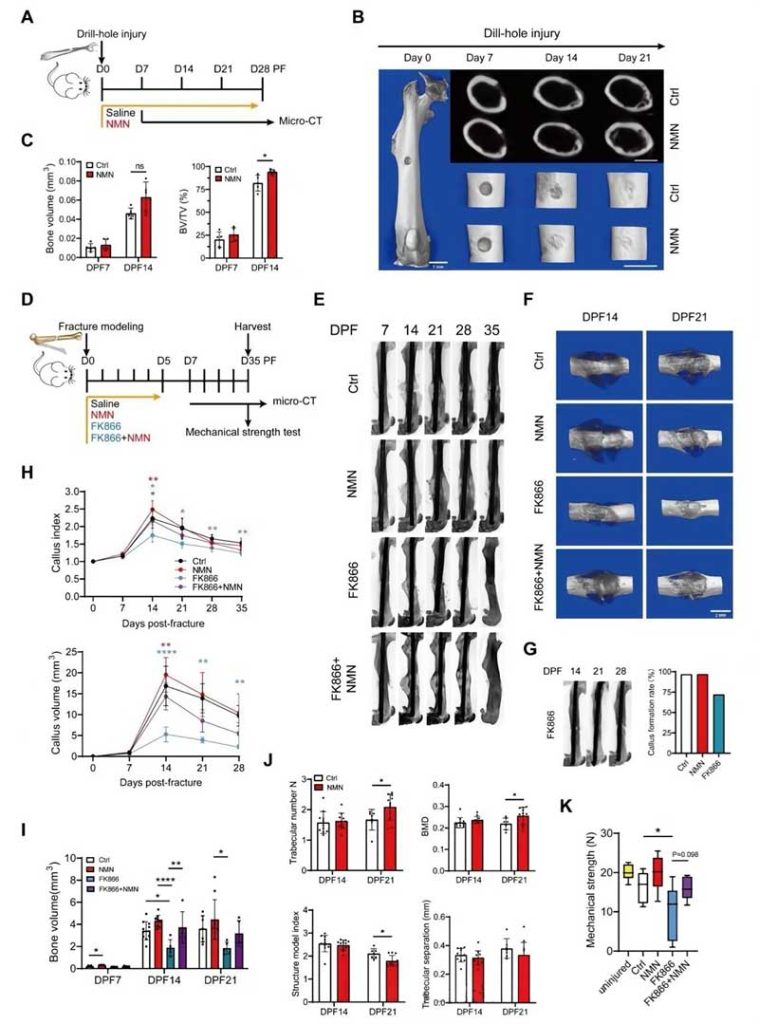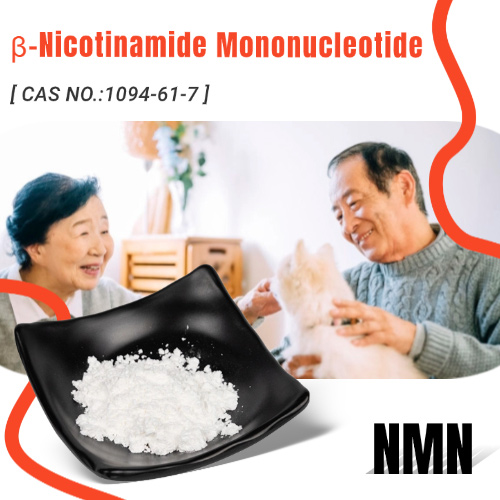NMN promotes bone stem cell proliferation and helps fracture healing
The research team recently published an article in the journal Theranostics showing that taking NMN significantly increases total NAD levels within callus to enhance cartilage callus formation and activate the regenerative potential of stem cells within bone.
This finding highlights the relationship between NAD and the ability of stem cells to regenerate during bone injury healing, thereby advancing NMN as a potential treatment for fractures and even osteoporosis.
Bone regeneration after fracture is a complex process mainly characterized by endochondral osteogenesis.
Insufficient and smaller cartilaginous callus caused by aging, diabetes, and smoking can hinder subsequent new bone formation and lead to impaired healing outcomes.
In contrast, larger chondrocallus can promote fracture repair, such as the administration of estrogen, magnesium implants, and teriparatide.
Recruitment of different stem cell populations begins to proliferate at the fracture site, leading to the subsequent formation of chondrocallus, which is essential for overall fracture repair.

Nicotinamide mononucleotide (NMN) is a key biosynthetic precursor and enhancer of nicotinamide adenine dinucleotide (NAD) and is essential for the maintenance of NAD homeostasis.
It regulates NAD-dependent enzymes, including the deacetylase family and polyADP ribose polymerases, which are critical in mitochondrial metabolism, DNA damage repair, and immune activation of T cells.
In addition to its role in alleviating aging, NMN supplements have also shown therapeutic benefits for diseases associated with NAD metabolic disorders, including heart failure, kidney damage, and neurodegenerative diseases.
Notably, NAD precursors enhance the function of skeletal muscle stem cells to accelerate skeletal muscle regeneration, highlighting the potential of NAD precursors in tissue repair mechanisms.
Studies have shown that aging related bone mass loss and subsequent osteoporosis can be mitigated by NAD supplementation.

NMN supplementation accelerates bone formation during bone injury healing
To determine the effectiveness of NMN in promoting adult bone injury repair, the researchers conducted a drilled injury animal model and administered NMN for 4 weeks.
3D reconstruction images on microCT scans showed that the NMN treatment group had more mineralized callus tissue at the injury site on day 14 after surgery compared to the control group.
Compared with the control group, NMN treatment showed a tendency to increase bone volume (BV) and significantly increased the ratio of bone volume to total volume (BV/TV) at the injured site from day 7 to day 14 postoperatively.
These results suggest that NMN supplementation accelerates bone formation during bone defect healing.

NMN promotes early chondrogenesis after fracture
To investigate the effect of NMN on early callus composition, we performed a histomorphometric analysis of fracture callus sections at days 7, 10, and 14 postfracture.
The proportion of cartilage derived from different types of cartilage progenitor cells assessed, and the mean cartilage content in the NMN group 47.5% at day 7 post-fracture compared to 38.9% in the control group.
At days 10 and 14 post-fracture, there was little difference in the proportion of cartilage between the NMN treatment and the control group. Histological analysis confirmed a 38% increase in new bone formation and mineralization in the NMN group at day 10 post-fracture compared to the control group.
These data suggest that NMN contributes to the formation of cartilage tissue and the subsequent transformation of new bone tissue, thereby accelerating fracture healing.

NMN stimulates the proliferation of stem cells in callus
NMN supplementation significantly enhanced the activation and proliferation of bone stem cells SSC and osteochondral stromal progenitor cells BCSP at 7 days post-fracture.

Nicotinamide Mononucleotide induces the expansion of stem cells in callus and activation of Notch signaling pathway, and has a significant proliferation effect on stem cells in callus.
Clinical studies support the extension of healthy life with NAD+ precursor NMN
Other clinical studies have shown different effects of Nicotinamide Mononucleotide on organ systems and tissues, such as insulin sensitivity, muscle oxygen absorption, and overall physical performance.
In fact, the findings provide more evidence that NMN supplementation can improve metabolic, hormonal, and skin health.
Positive changes in a range of markers representing multiple organ systems suggest that NMN has the ability to delay aging and extend overall healthy life span.
Since Nicotinamide Mononucleotide was discovered and confirmed by Professor David Sinclair of Harvard Large Medical School in 2013, it has been confirmed by scientific and clinical studies that after supplementing NMN, it is converted into NAD+ in vivo to show five major functions:
- Provides energy for the cells
- Activate the Sirtuins family of long-lived proteins
- Maintain mitochondrial health
- Repair damaged DNA in cells
- Eliminate the underlying causes that accelerate the aging process
From the age of 30, the level of NAD+ in the human body will decline as people age, when NAD+ is reduced, the cells can not establish effective communication, energy will decline, mitochondrial dysfunction will appear.
Cell apoptosis thus manifested in the body as aging and disease.
By supplementing NMN, aging can delayed, and increasing NAD+ in the body can prevent and delay a variety of age-related diseases, including aging and damage of heart, liver, kidney, lung and other organs, chronic hepatitis B, recovery after COVID-19, cardiovascular diseases, improve female ovary and male spermatogenic function, delay aging of brain and nervous system, improve intestinal flora, hyperglycemia and hypertension, and reduce the risk of aging.
Weight management, reproductive aging, etc.
reference
Theranostics 2024 Sep 16;14(15):5999-6015.




